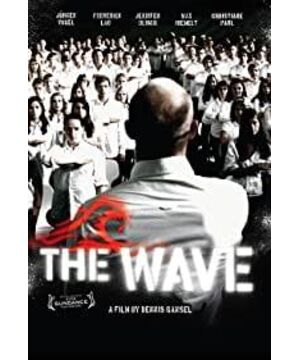The German film "The Wave" is adapted from this real event. Director Dennis Gansel's last film also explored totalitarianism, titled "Hitler's Boy." Gansell's continuous thinking about the Nazi phenomenon sets him apart from ordinary directors. His views are as precise as those of political scholars, not to be confused by appearances, but to get to the core. In the movie, there are two things that are fascinating. Generally speaking, one of the clichés about the Nazi movement is that it is "racism." Gansell completely avoided this angle. He went to a deeper place and defined it ruthlessly as "egalitarianism." What is it that makes people enthusiastically invest in totalitarian organizations, even at the expense of personal freedom? Gansell replied with the words of a "wave" activist: Totalitarian organizations provide the illusion of "equality". "Life these days is very interesting. It doesn't matter who is the most beautiful and who has the best grades. The'wave' makes us all equal. Origin, faith, and family environment are not important. We are all members of a movement. The'wave' regained meaning in our lives and gave us an ideal to fight for." Gansell further pointed out that the Nazi phenomenon is a product of left-wing thought. At the end of the film, Reiner Wenger, the teacher of this political class, the head of the "wave", like a resurrected Hitler, delivered a crazy political speech. He raised his arms and shouted on the stage, and the students in the audience were intoxicated. And his rhetoric is entirely the position of the New Left, opposing globalization, accusing the "disparity between the rich and the poor" as real terrorism:
"Germany has gone from bad to worse in recent years. We are the losers of globalization, but the government tells us, Working hard is the only way to get out of the crisis. Those politicians are basically puppets of economic animals. The unemployment rate must fall. We are still a big exporter, but in fact, the poor get poorer and the rich get richer. Terrorist activities are the biggest nowadays. The threat of terrorism is caused by ourselves, through spreading injustice. When we push our planet to destruction step by step, the rich people are gearing up to build a space station and want to go from a height. Come and appreciate it all."
This is the pungency of the director, and his critical edge is directed at the current "anti-globalization" movement. This is the "just" cause that left-wing intellectuals and enthusiastic youths are most enthusiastic about in recent years, but Gansell has warned that this may be a new totalitarian movement. Even for this "anti-totalitarian" teaching incident 40 years ago, although Gansell used it to fully express his ideas, he did not want to stop there and accepted the whole incident without thinking; on the contrary, he was right. The teacher's approach expressed strong doubts. In the film, he designed a character called "Tim". He is from a rich family, but the family lacks warmth and has always been eager to join the collective and get rid of loneliness. After the establishment of "Inspur", he was the first to respond to the call of "equality" and burned all his brand-name jerseys and shoes. Through this collective, he feels that his small self has been magnified and his self-worth has been enhanced. He has become more and more fanatical and paranoid. He changed his usual cowardly image, and even risked his life to spray and paint "wave" signs everywhere. However, when such a person devotes all his body and mind, and wins the praise of others, he suddenly collapses when he suddenly discovers that this is just a teaching scam. He couldn't accept the disbandment of "Lang Tide", took out a pistol, wounded a classmate, swallowed a gun and committed suicide. Many commentators thought that this arrangement in the film was for dramatization or borrowed from the "Dead Poetry Society", but in fact this is an expression of the director's own ideas. He tried to convince the audience: this kind of teaching is dangerous, as long as there is an unsound person like "Tim", the whole incident will become a tragedy. In fact, his worries are not unreasonable. Forty years ago, although there was no uncontrollable chaos in the teaching experiment, most of the students who participated in it did not want to mention it. After many years, they still felt embarrassed and felt that they were played and humiliated. The only person who benefited from the incident was the teacher. He accepted media interviews and sold the copyright of the story until the movie "The Wave" was released. He also said with an incomparable winner's tone: "The reason why this experiment will This result is because many of us are lonely, lack family warmth, collective care, and lack a sense of belonging to a group. Even if we put this experiment today, we will get the same result..."
The question is, is such a shocking education appropriate? In order to understand the harm of totalitarianism, one must suffer the harm of totalitarianism. So, in order to understand the pain of anal fissure, is it necessary to be exploded once? The teacher is an authority on the forum and has the power to correct students' test papers and drive students out of the classroom, but his duty is to impart knowledge, not to change their life course. In order to teach, is it necessary to turn students into lab mice and let them experience some imposed inner frustration? In the movie, Gansell retained these controversies and expressed his doubts through teacher Miguel’s wife, “You enjoy the attention they admire you in class”, “The students see you as a role model, and you Use this to manipulate them. In fact, it's your selfishness behind it." "You have become a bastard during this time." In an unobtrusive place, Gansell even expressed his views on education. A female member of the "Inspur" returned home and saw her younger brother messing around, asking her mother to interfere with him and restrain him with "discipline". The mother refused and said, "Your brother should discover his bottom line by himself." Ms. Miguel, although he kept telling himself, this is an experiment that ends soon, and the purpose is to let students understand the preciousness of freedom. But the good result he expected did not appear. Instead, there was a bloodshed and a debt of life. In the film's finale, the teacher was taken away by the police. Everyone looked at him with contempt and anger in their eyes. They were deeply hurt by this teacher. The teacher sat in the police car in a daze, losing any expression on his face in pain. He is the culprit, no matter what good purpose, he did it after all. He did it, he caused it. He is not opposing "dictatorship", he is carrying out "dictatorship."
If the meaning of the film is extended, this film is about the reflection on "enlightenment". There have always been two "enlightenment" views. One is the concept originated from the Scottish Enlightenment, emphasizing individualism, advocating that knowledge is separate, everyone can make choices according to their own reason, and what suits them is the best. There is also the concept of the European Enlightenment, with Kant as the representative. In this concept, the truth is in the hands of the intellectual elite, and they can truly distinguish right from wrong and measure good and evil. The public is ignorant and superstitious and needs to be indoctrinated. Only with correct concepts can we escape from immaturity and overcome laziness and cowardice. The teacher Miguel in the film is actually the embodiment of the latter view of enlightenment. He is the soul engineer of the students and the chief designer of "Inspur". The mistake he made was "fatal conceit", he lost the patience for interpretation and persuasion, and put students in a passive position to experience, instead of allowing them to think in free choice. Originally, everyone was led by him to run wolves on this road. Seeing the edge of the cliff, this leader suddenly turned into a savior, telling people that the game is over, everything is back to the original state, and it’s the only way to go back. right way. It's like starting in 1949, you were instilled in your big brother a notion that being rich is shameful. Then in 1979, suddenly Big Brother told you that the correct answer was that poverty is shameful. In this version of the Enlightenment Movement, the ultimate victory of course cannot be rational knowledge. From the beginning to the end, it is only the manipulation of power.
Looking back in history, every time the rise of totalitarianism is accompanied by a vigorous enlightenment, intellectuals who claim to have advanced ideas are active among them. In the name of educating the masses and transforming human nature, they have made suggestions for almighty power and created strange worlds. hell. Take the Khmer Rouge, for example, the high-level figures were all intellectuals who had studied in France, under the tutelage of the Enlightenment thinkers Fanon and Sartre, but they did all horrible and dirty things. Of course, this topic is too far away, and we need to walk into the history of modern concepts to examine it carefully. In what sense the Enlightenment triggered totalitarianism has always been an intricate puzzle. As a movie, it just tells us in a simple, vivid and intuitive way that totalitarianism is an intellectual phenomenon. In fact, this is a very novel perspective, at least in Nazi-themed movies, it is unique and very thought-provoking. In my opinion, this movie can be regarded as a powerful rebuttal to "Reader". In "The Long Reader", in the face of totalitarianism, knowledge acts as a power of salvation, and enlightenment finally drives out "banal evil". However, this "The Tide" says in the opposite direction: Knowledge can be a disguise of power, and enlightenment can be an excuse for manipulation; totalitarianism has not died out in history, he will give orders from the podium, but you have not discovered it yet.
View more about The Wave reviews










